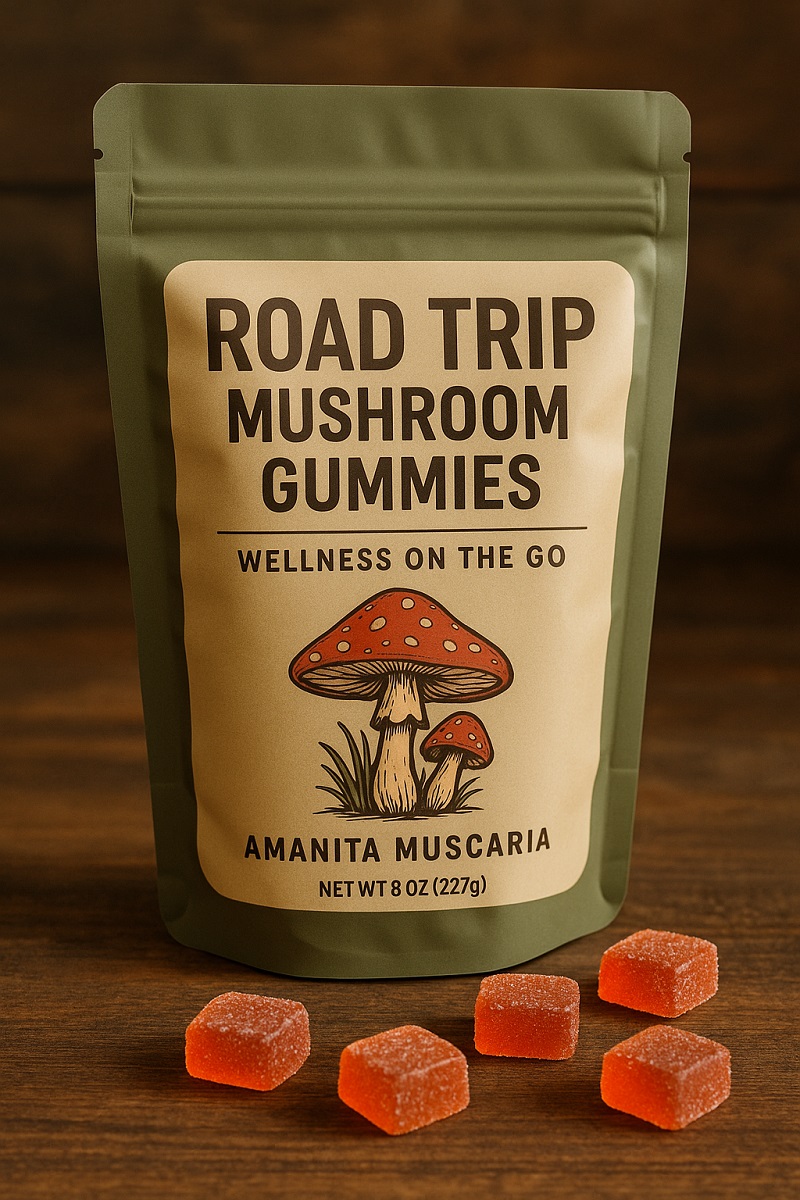A Trend Worth Chewing On?
The wellness industry never sleeps—and its latest darling is chewy, colorful, and surprisingly controversial. Road Trip Mushroom Gummies, a fusion of functional fungi and fruity flavors, have hit the market with promises of calm, clarity, and even psychedelic experiences—all packed into a travel-friendly bite.
Promoted as the perfect snack for long drives or stress-free weekends, these gummies are being hailed by influencers and boutique supplement brands alike. But as with many so-called “natural” products flooding shelves, it’s worth asking: Are these mushroom gummies truly a step toward eco-conscious wellness, or just another example of clever green marketing?
Let’s dig into what they are, how they work, and whether they belong in your glove compartment—or the greenwash bin.
What Exactly Are Road Trip Mushroom Gummies?
At their core, Road Trip Mushroom Gummies are edible supplements that contain various types of mushroom extracts—either functional, like Lion’s Mane and Cordyceps, or psychoactive, like Amanita muscaria.
Available in high-potency options like 14,000mg per pack or microdosed versions for daily use, these gummies are positioned as a legal, plant-based alternative to traditional psychedelics or nootropics. While they don’t contain psilocybin (the hallucinogenic compound in magic mushrooms), they often include muscimol or nootropic stacks that can mimic mental clarity, relaxation, or even mild euphoria.
Some popular claims made by manufacturers include:
- Enhanced focus and creativity
- Stress and anxiety relief
- Mood stabilization
- Immune support and gut health
It sounds impressive—but what does science say?
Variants of Road Trip Mushroom Gummies: What’s Inside the Pouch?
Not all mushroom gummies are created equal. The market offers a wide variety—each with different mushroom species, effects, legal statuses, and health considerations. Here are the three most common variants seen in Road Trip-style products:
- Amanita Muscaria Gummies
- Main Ingredient: Amanita muscaria extract (contains muscimol and ibotenic acid)
- Effect: Mild to intense psychoactive experiences—vivid dreams, altered perception
- Legality: Legal in most U.S. states; not federally scheduled
- FDA Status: Not approved by the FDA
- Caution: Dose-sensitive; high doses can lead to nausea or disorientation
- Desert Stardust Gummies
- Main Ingredient: Proprietary blend of adaptogens, tryptamines (non-psilocybin), and functional mushrooms
- Effect: Mood enhancement, introspection, subtle perception shifts
- Legality: Unregulated but marketed as legal
- FDA Status: Not FDA-approved; ingredients often undisclosed
- Caution: Low transparency raises safety questions
- Microdosed Functional Mushroom Gummies
- Main Ingredient: Legal functional mushrooms like Lion’s Mane, Reishi, and Cordyceps
- Effect: Cognitive support, stress reduction, immune boosting
- Legality: 100% legal in the U.S.
- FDA Status: Ingredients classified as GRAS (Generally Recognized As Safe), though supplements are not formally “approved”
- Caution: Watch for added sugars or synthetic fillers
✅ Tip: Always check for full ingredient lists, lab testing, and ethical sourcing—especially with psychoactive or proprietary blends.
The Health Claims: Backed by Research or Mushroom Mirage?
Not all mushrooms are mythical superfoods—some have credible health benefits, while others are riding the wave of wellness hype.
Evidence Snapshot:
| Mushroom | Claimed Benefit | Scientific Backing |
| Lion’s Mane | Focus, memory, brain function | Moderate support in human and animal studies |
| Cordyceps | Energy, endurance | Some support in athletic performance trials |
| Reishi | Immune regulation, anti-stress | Early-stage support; more studies needed |
| Amanita muscaria | Euphoria, dream enhancement | Historical use; lacks modern clinical trials |
Many Road Trip Mushroom Gummies bundle these claims under vague marketing terms like “clarity,” “relaxation,” or “vibe.” But these effects often depend on dosage, extraction method, and individual tolerance.
Without standardized testing or ingredient transparency, it’s hard to verify the promised benefits—or predict side effects.
Environmental and Ethical Sourcing: How “Green” Are They?
These products often come cloaked in eco-friendly branding—think earth-toned packaging, leaf logos, and words like organic, vegan, and natural. But does that mean they’re truly sustainable?
❌ Common Greenwashing Red Flags:
- Non-recyclable packaging (plastic-heavy and excessive)
- No certification for organic, non-GMO, or sustainable harvesting
- Undisclosed mushroom sources (wild foraged? cultivated? lab-grown?)
- No mention of carbon offsetting or ethical labor practices
✅ What to Look For:
- Compostable or biodegradable packaging
- Transparent sourcing (e.g., “lab-grown Lion’s Mane, Oregon-based farms”)
- USDA Organic or third-party certified production
- Verified no animal testing or deforestation-linked harvesting
Until brands are held to higher standards, many “green” claims remain unverified marketing—not true sustainability.
⚖️ Legal Loopholes and Labeling Grey Zones
The legality of mushroom gummies is complex and state-dependent, and the FDA has yet to formally approve any psychoactive mushroom product as a supplement or food.
Key Issues:
- Psychoactive mushrooms like Amanita are not scheduled, but not FDA-approved either
- Functional mushrooms (Lion’s Mane, Cordyceps) are legal but loosely regulated
- Labeling often includes “proprietary blends” with undisclosed dosages
- Brands may skip third-party testing, relying instead on vague “natural” appeal
A 2024 FDA bulletin warned of mushroom edibles linked to emergency room visits due to mislabeling and overconsumption.
Are Road Trip Mushroom Gummies Legal and Safe?
Are Road Trip Mushroom Gummies Legal?
✅ Lion’s Mane, Cordyceps, Reishi (Functional) — Legal & considered safe
⚠️ Amanita muscaria — Legal in most U.S. states, but not FDA-approved
⛔ Psilocybin mushrooms — Federally illegal, banned in most states
Are Road Trip Mushroom Gummies Safe?
✔️ Microdosed functional gummies = Low risk when sourced responsibly
❌ Psychoactive blends = Riskier due to unregulated dosages and labeling gaps
⚠️ Important: Always avoid driving or operating heavy machinery after consuming psychoactive variants.
Consumer Trends vs. Red Flags: Why Popular Doesn’t Mean Safe
Despite being unregulated, often not FDA-approved, and sometimes legally ambiguous, Road Trip Mushroom Gummies have surged in popularity. Why? Smart branding, influencer hype, and growing curiosity around legal psychedelics have created the perfect storm for consumer demand.
But popularity doesn’t equal safety. And here’s where it gets risky.
Why Are Road Trip Mushroom Gummies So Popular?
-
Buzzword Branding: Phrases like natural, plant-based, and microdosed create a perception of safety and eco-consciousness.
-
Influencer Influence: TikTok trends and social media reviews glamorize mushroom gummies as stress-busters or creativity boosters.
-
Curiosity Around Legal Psychedelics: Consumers are eager to explore mind-altering experiences within the bounds of what appears “legal.”
-
Regulatory Loopholes: Gummies that contain Amanita muscaria or ambiguous “proprietary blends” often bypass strict oversight.
Red Flags Every Consumer Should Watch For
| ⚠️ Warning Sign | ❗ Why It’s Concerning |
|---|---|
| No third-party testing | You can’t confirm safety or ingredient accuracy |
| Uses “proprietary blend” | Hides the true dosage of psychoactive or functional mushrooms |
| No FDA disclaimer | Misleads consumers about legitimacy |
| Overpromises effects like euphoria or “natural high” | May be misleading and dangerous |
| Psychoactive effects with no warnings | Can impair driving or decision-making |
| Excessive plastic packaging | Contradicts eco-branding claims |
Smart Consumer Tip
Even if it’s trendy or labeled “natural,” research first, chew later. Ask yourself:
Is it tested? Transparent? Truly sustainable?
If not, it may be more gimmick than green.
Do They Belong in a Sustainable Travel Kit?
The name alone—Road Trip Mushroom Gummies—suggests a natural fit for eco-minded travel. But does that hold up in practice?
✅ Pros:
- Convenient size; shelf-stable; travel-friendly
- May reduce need for caffeine or synthetic medications
- Some brands offer vegan and sugar-free options
❌ Cons:
- Packaging waste (especially single-use plastics)
- Unclear sourcing and transparency
- Psychoactive variants may impair driving or decision-making
Eco Tip: For a truly green travel kit, consider pairing verified functional mushroom gummies with reusable containers, herbal teas, or essential oil blends.
What Conscious Consumers Should Ask Before Buying
If you’re browsing for mushroom edibles with the environment and your health in mind, ask these before adding to cart:
- What types of mushrooms are used—and how much?
- Is the product third-party lab tested?
- Are the mushrooms sustainably cultivated or lab-grown?
- Does the packaging meet eco standards (biodegradable, recyclable)?
- Is the brand transparent about its supply chain?
Being informed turns you from a consumer into a conscious advocate.
Conclusion: Functional Innovation or Fungal Fakery?
There’s no denying the appeal of Road Trip Mushroom Gummies—they’re trendy, convenient, and wrapped in the glow of natural wellness. But when you unpack the shiny branding, what’s left is a mix of potential, performance gaps, and greenwashing risks.
The best-case scenario? Microdosed, sustainably packaged functional gummies backed by real research. The worst? Mystery blends with untested psychoactives that aren’t as “natural” as they seem.
Final verdict: Until regulations catch up, stay informed, shop smart, and chew carefully.
❓ FAQs
Are Road Trip Mushroom Gummies legal?
Yes, most are legal in the U.S. if they don’t contain psilocybin. Amanita muscaria is legal in most states, while functional mushrooms are widely permitted.
Do Road Trip Mushroom Gummies get you high?
Some can. Amanita-based gummies may cause altered states, while functional gummies do not.
Are they FDA-approved?
No. Functional mushrooms are often GRAS, but mushroom gummies are not formally FDA-approved supplements.
Are mushroom gummies safe to use while driving?
Avoid psychoactive variants before driving. Functional mushrooms are safer, but always check effects on alertness.
Are they sustainable?
Some brands make efforts, but many use plastic packaging and lack sourcing transparency.



